#and that the situation was complicated and nuanced takes are necessary
Text
the next time i see americans blindly supporting the fucking ira i am going to kill someone
#no i actually dont care what they started as#i dont care whether not all of the original ira were provos#because nowadays when you say ira#or tiocfaidh ar lá#or dumb shit like that#no one is fucking thinking of the war of independance#and its all well and good for you to be like#'wah wah its very important to my ancestors'#when you have one great grandfather who went over in the 20s#but you fail to realise that for anyone actually living in the fucking country#or with any real connections to it#that to refer to the ira is to refer to a terrorist organisation#who has killed many innocent people#and before any of yous start i am not a fucking unionist#i do not like england ask anyone who has ever interacted with me#and i understand that they were originally freedom fighters#and that the situation was complicated and nuanced takes are necessary#but what the ira became was an organisation which killed civilians and children#and they are not a group which should be blindly and emphatically supported by people who know nothing about them#other than that they wanted independance#mo rudaí
1 note
·
View note
Text
i love revenge tragedies so so much because they have so much potential to explore such a nuanced and complex topic and give it the consideration and care it deserves. revenge and revenger characters are such powerful narrative tools, both of catharsis and self reflection. a good revenge tragedy will not tell you that "revenge is bad, seeking revenge makes you just as bad as the people you're seeking vengeance against, and nonviolence and forgiveness are the only paths to building a better world". a good revenge tragedy will present you with a really difficult and complicated situation, even something absolutely unforgivable, and ask you to consider questions like "will this really help anyone?" "am i doing the right thing, or am i just doing what feels good?" "how far can you go before your quest for self-empowerment and personal satisfaction becomes perpetrating the same violence that you claim to be fighting against?" "what else could i do to help build a better future for myself and others, to ensure that the cycle of violence doesn't continue after justice is served?" "what went wrong here? how did something that seemed so right go so wrong?" and "what would i do in this situation?"
sayings like "those who live by the sword will die by the sword" and "those who fight monsters should take care they don't become monsters themselves" often get oversimplified, misinterpreted, and used to criticize people from feeling justifiably angry at their mistreatment and oppression, and discourage them from seeking the restitution they're owed. but when used correctly, a good revenge tragedy will employ these ideas as tools of teaching and learning, of questioning and discussion, of analysis and communication, and as a reminder to think critically and to think for yourself, not as a moral lesson. and those stories are so incredibly and important and valuable to me, and i believe that they have a very necessary place in the world.
#🐉#this is NOT a direct response to the tweet i shared earlier. however that tweet IS a good discussion point and it is what got me thinking#about this so i really appreciate the original poster having made it#anyway ive thought a LOT about my own capacity for violence and desire for revenge and the human condition can you tell
4K notes
·
View notes
Note
hi, i'm not the person who asked you about the life update, but could you elaborate on how being a creator means to live in a world of ideas instead of the real world? i'm just really curious about your reasons for quitting, specially because i want to create things in the future (not necessarily streaming, but anyways), hope you have a good day!
i'll be talking mostly about streaming for the sake of this answer, but this is similarly applicable across a wide range of platforms:
the job of the streamer is, effectively, to be the life of the party every single day. your goal is to be the person that has something interesting to talk about, and is quick with a joke, and has nuanced understandings of certain things, without actually obtaining any sort of "expertise" in anything lest you alienate viewers. short of having a stated goal for a stream, the only goal of the streamer is to let people relax with a voice they enjoy, saying things they like hearing. you can become very strong in different aspects of streaming, like in the production, or as someone who focuses more on a skill they've honed like art or speedrunning, but the demographic of streamers which pulls, by far, the most significant viewership, is personality based streamers.
this becomes more complicated when, for example, you are very interactive with chat, or you stream with multiple people at once. now, to maintain this charismatic sway you have (the one that got you the job in the first place), you must be able to adapt to and bounce off of other people, as you are now no longer performing alone. naturally, there's a need to not only manage your own flow of consciousness, but also to be at least partially in sync with someone else's.
beyond these complications, you must also consider drawing in new viewership. when i was a streamer, i was quite successful, relatively speaking. pulling 300 viewers consistently is something a very slim amount of streamers can actually do, and even then i was still making under 50k a year, which is not bad, but also not good. in paying for my apartment, my insurance, my travel fare, and all the other stuff that living independently draws money out of you with, i was more often in the red than i was in the green. hence, the need to draw in new viewers, which cannot be done without something eye-catching.
think about this: there are, at any given time, TENS OF THOUSANDS of streamers live in your native language on twitch, and they are all FREE TO WATCH. the attention market is sparse because the streamer market is oversaturated. and considering all of THEM want new viewers too, everyone is constantly refining and improving their craft, which requires everyone to move creatively in tandem with each other lest they get left behind.
if you are a streamer making ass-dollars and ass-cents, it becomes easy to begin resenting people like jerma, solely because everything he touches seems to turn to gold. i personally found it easy to feel very disappointed in myself when peoples projects that seemed so simple would take off. it was a constant "why didn't i think of that!" situation, at least for me. and when you don't have the energy to keep that up, or the social stamina necessary to figure that all out while also being upbeat and happy in front of people near daily, it can become very draining.
what i mean specifically when i say the "world of ideas", is like. there would be times where i could schedule out my failures weeks in advance. i'd be so in my own head about the process, i could see the exact path i could see myself taking that would lead me directly to ruin. how playing games i actually enjoyed would steadily drop viewership, or how focusing on my studies would make people forget about me. and of course this is augmented by my anxiety, i know this is absolutely not the case for every streamer, but that overwhelming feeling of needing to find a new game to play, or a new gimmick to use, or a new ploy to get money that doesn't make you feel guilty even though your source of income is mostly queer and mostly poor young adults and your rent is coming up and you're $200 short but you also just had a fundraiser last month about a DIFFERENT emergency but you cant make it a bummer or else people wont want to tune in so you have to make it something fun like "you laugh you lose!" or "$1 art request streams!" while feeling nothing but anxiety while youre trying to sound like youre enjoying yourself even when youre asking 250 people to donate every 30 minutes or so and nobody seems to want to and chat is moving slowly and. and and.
well, it starts to eat away at you.
165 notes
·
View notes
Text
On Haiti's 220th anniversary
Two hundred and twenty years ago, former slaves and free people of color accomplished the seemingly impossible: defeating one of the most formidable European armies of the day and establishing a new state where bondage, as it existed before 1791, would be forever abolished.
For those who have followed this blog since 2013, you know that I (admin A) have rarely allowed myself any sentimentality when discussing Haitian history. I have tried to present a nuanced portrait of Haiti’s past by addressing the weight of the many isms that have plagued its history (colonialism, racism, neoliberalism…) and by taking a critical look at the role of Haitian leaders throughout all these episodes.
Two hundred and twenty years after the unthinkable, Haiti finds itself without a president, grappling with what seems to be a permanent problem of armed gangs, little security, renewed multifaceted tensions with its Dominican neighbour, and on the brink of a new UN occupation through a Kenyan mission. The young woman who started this blog a decade ago would have said that there are little reasons for us as Haitians to celebrate—not because of a difficulty appreciating the great shoulders on which we stand, but because, at twenty-two years old, I didn’t believe in what I felt was useless romanticism binding us to a distorted past while also blinding us to the reality of the disastrous present.
Today, it’s not so much that I find much to rejoice in given the current state of affairs. It’s that I realize, what is the point of all this if there is no hope? Why this blog, why study the history of Haiti at all, why care about the country? For those of us with family there, why not temporarily send money in the hope of helping them relocate here, there, and anywhere except Haiti? Why not congratulate the complete erosion of Haitian sovereignty, as post-1986 Haiti, and especially Haiti of the last two decades, has shown so vividly the complete utter failure of its foreign-backed governing class?
I don’t know what hope is supposed to look like in this situation. Hope for what? Hope for a change under what conditions, under whose authority? On what would this hope be grounded? Perhaps, despite the best efforts of my twenty-two-year-old self, I am becoming as naive and sentimental as the people I silently criticized then...
Perhaps, however, I recognize that Haiti does matter. Even the most cynical among us would admit that there is something profoundly radical in breaking the bonds of slavery, in affirming that people of African descent could not be stripped of their humanity, that there is something poetic in saying “no” in the face of impressive odds. Newly independent Haiti did not live up to some of the promises of its complicated Revolution. The 1825 French imposition of an indemnity severely affected freshly formed Haiti (beyond the 19th century), but it does not excuse the incompetence of Haitian governments, then and now. Haiti could, may have, and I certainly hope, will change, will remember what 1804 ought to have meant.
Perhaps, especially for the people who currently live in Haiti, particularly the women of all ages who face the constant threats of sexual violence, Haiti has a responsibility to itself, to its unprecedented idealism, to all of us.
Given all these reasons, I find it necessary to maintain a guarded optimism, acknowledging that ideas hold significance and possess the potential to materialize into reality.
120 notes
·
View notes
Text
Why I think Izzy’s death was actually necessary despite me being sad about losing my favorite* character…
So I am once again looking to reframe a moment/scene involving Izzy around Ed because as much as Izzy was his own character (with a wonderful redemption arc) his function in the narrative imo is as an extension of the Blackbeard persona and therefore Ed and his perception of himself
Ok so this is gonna be long but I think it’s necessary to frame this properly
Izzy and Ed’s relationship is one of misery loving company and instead of finding ways to legitimately pull each other up and heal from whatever brought you to that place it turns to one of toxicity where you either repress the trauma (Ed never telling anyone that he killed his father, that he feels like a monster) or express it in ways that only perpetuate the misery. At this point that constant cycle of misery is so familiar it can be difficult for the participants to recognize what they’re doing to themselves and each other and it’s difficult to not fall back into those patterns.
So while Izzy is making strides and having his arc, instead of saying to Ed maybe don’t go looking for darkness when you’re standing in the light, don’t look for trouble or problems that don’t exist just because that’s what you’ve come to expect he says maybe you’re just a mopey twat and there isn’t a fuckin storm, when Ed does apologize for his leg Izzy’s only response is fuck off.
They can’t communicate with each other effectively and it’s already caused issues. When Izzy tells Ed to listen to the feeling of throwing away the trappings of Blackbeard, Ed does but he has also been told by Izzy that Ed isn’t good enough so why would Stede want him now that he’s not gonna be Blackbeard. I think Izzy meant well and had the right sentiment but the fact is that the damage of what they do to each other has already been done. Izzy doesn’t just represent the devil on Ed’s shoulder, he’s the voice in his head telling him he’s worthless without Blackbeard.
So could the narrative have just said Izzy went off on his own or went with the crew in the end? imho no they couldn’t because in order to have a healthy relationship with Stede, and just to be a generally well adjusted person Ed needs to love himself and the constant knowledge that his self loathing can just pop up out of nowhere (something explicitly shown as an Izzy staple) won’t allow him that freedom. (I recognize this isn’t how self development/self esteem works irl but this is a dark comedy rom com just let some things be hand wavy.)
Sometimes the best way to help each other grow and be whole is to recognize that you need to let the other person go. That’s true for BOTH of them.
Izzy dying was the only way they could finally communicate honestly without the jibes and the looming Blackbeard of it all they could just talk to each other as family as people who love each other (this is not my ship and I have a serious issue with the lack of nuanced takes on love in this fandom but that’s a separate issue).
To give Izzy some grace here I would like to point out that his story can also be seen as one that tells the audience that toxic people in your life or people you have complicated relationships with are allowed to grow on their own and make positive changes for themselves BUT that does not mean you have to accept them back in your life, you are not required to give them space after they’ve wronged you. You can celebrate their growth but you don’t owe them anything. Ed can recognize that Izzy has changed but he was never going to fully excise Izzy from his life he’s too familiar and too much a darkness to hide in and it would have created more toxic situations. So yes Izzy had to die.
*I always mean favorite side character because my favorite character is EdStede/StedeEd. If you don’t love them, together and separately then you don’t love the show because this is their story
#yes I still cry whenever I watch this scene#I’m also masochistic enough that I added Du Gamla to my playlist#and I cry about that too#this may end up just being for me but I needed to get it out of my head#izzy hands#the new unicorn#edward teach#ed teach#blackbeard#stede bonnet#the gentleman pirate#blackbonnet#gentlebeard#ed x stede#our flag means death#ofmd season 2#ofmd s2#ofmd
71 notes
·
View notes
Text
To give my thoughts on the fandom discussion of the handling of DID Mikoto/John's writing after the Double mv, I think my main frustration is just the somewhat black and white attitude many people have being viewing things with. In all honesty, I think the writing is complex situation that's a lot more then just 'good rep vs bad rep'. Instead, it almost could be better viewed through what the writing choices are attempting to explore/say about the character vs what ended up coming across to viewers? Its especially hard when we're only partially through the series, meaning a lot of your current opinion has to come from how strong your faith is in the series providing satisfying narrative conclusions to all the threads we've been presented with so far. But even then, I think its both fine to be uncomfortable with his portrayal or be satisfied with it - and that mixed reaction is generally what I've seen so far, particularly from viewers who are systems themselves. Its important for us singlets that we take into account the opinions of systems who are willing to comment on the character while also using our own critical thinking. Things seem to have been a lot better so far in that regard, which is great to see.
As for me personally? I have to say that I trust in the series to deliver nuanced and respectful writing. When you take a look at the series from a wider perspective, Mikoto and John's circumstances do tie into Milgram's exploration of societal issues in a way that I'd expect to be handled with care and empathy going forward. I feel the presentation of such flawed characters and the conflicts that can arise in our voting as a result of it can be applied to not just here but all the characters in at least some way. John isn't, and was never meant to be portrayed as purely antagonistic or monotonous, and I'm glad that idea has gotten more focus in this trial. This complex presentation of the cast's actions, as confronting as it often may be, have always been to help us understand and connect with the prisoners, rather than demonize them as foreign entities. This is particularly notable in Mikoto's case because of the divisive nature of mental health as a subject matter, but is definitely not the only occurrence of it in the series.
However, Mikoto's case is definitely not perfect from a writing perspective and its important to be critiqued when necessary! Regardless of good intentions, trying to write a disability as complicated as DID will inevitably contain both steps forward and backwards. Although my opinion towards the handling of Mikoto's DID in this trial lean towards positive, It's completely justified to be uncomfortable with it and we should respect those who feel that way. But yeah, it's just slightly frustrating that I've seen people acting as if you need to decide between 'this is good rep, defend the series with your life' and 'this is bad rep, drop the series entirely'. Of course, learning to observe your own bias and look beyond restrained dichotomies of judgement has always been one of the series' main intent, so it's interesting in how it's shown itself again this time around. It'll be extremely interesting to see how both Mikoto and John are going to develop as characters going forward!
#im not a system so please feel free to correct me on any mistakes i may have made here!!#i really hope this doesnt sound too preachy im really just rambling here tldr uhhh listen to systems please#anyways its been so fascinating to see the discussion for this case and its great to see the level of respect people have shown so far#mikotos never been a favourite of mine but this trial's had me way more interested in him so they've gotta be doing something right#milgram#mikoto kayano
93 notes
·
View notes
Note
Hi, Amy! How are you?
You know, I've been having a lot of thoughts about Homelander's relationship with both Ashley and the rest of the Seven, and wanted to share them, if that's okay :)
Although at first glance it really seems that Homelander just hates his team, I think that it's a bit more complicated than that.
Sure he likes to bully them, intimidate them and generally just play mind games with the team. He's a sadist for sure. However, I also think that he rationalizes his mistreatment of them as "toughening them up".
I've had a lot of teachers (and one terrible boss) who had this mentallity. They use the people bellow them as pounching bags, an outlet for their own frustrations because they know they won't face any repercussions, but they don't see it as an abuse of power. They think that this mistreatment helps to build character and it's necessary.
In a way, they think "they are doing us a favor", and in my mind that's exactly how Homelander sees his relationship with the Seven. "Oh, they re weak and pathetic and so bellow me, but it's okay, I'll make them better" basically.
It's also a form of revenge, because Homelander went through abuse as well while he was in the lab. So, now he believes that pain and humiliation is something everyone should go through because it will make them stronger. This helps him justify his own suffering too. Because if pain isn't necessary to become better, why did he have to go through that?
I think (weirdly enough) that this is particularly true when it comes to his relationship with women.
In his mind, Alex's death was not just a way to intimidate Starlight. It was a loss she needed to experience to "understand the situation she was in". That's why during the interview he held her hand and even said that he missed her, acting like everything was fine between them. Because what he did was for Starlight's benefit so she doesn't have a right to hate him for it.
His issues distinguishing reality from fiction (as in marketing and PR stunts, branding, etc) also played a role in that, but that's beside the point.
AND ASHLEY!!?? I have so many thoughts about how he actually is, deep down, VERY fond of Ashley but feels the need to terrorize her bc she won't be a useful paw if he goes soft on her. Even if she's just using her, you don't hang over the most sucessful company of the world to someone you hate.
Yes, everything he does is horrible and ill-intended, but he doesn't realize it!
He thinks he can hurt people and still have an emotional connection to them, because abuse is just an intrinsical part of any relationship. That's what Jonah Vogelbaum and Vought taught him, and that's why he's always so dumbfounded when people turn on him.
(Poor thing, he really needs to be commited at this point 😩).
aahh wow, so many good points! i agree that Homelander absolutely ascribes to 'tough love,' like pushing Ryan off the roof. that is undoubtedly exactly how he was taught to fly, too. you've nailed his warped perspective on how he goes about teaching people lessons.
though a good deal of his bullying, especially in regards to A-Train and Deep, seems like him lashing out against them for not being his dream team. he's at his worst with them when he feels small and insecure. he treats them as extensions of himself and his image, and when they fail to live up to that, it infuriates him.
i don't know if i entirely agree with the latent fondness beneath his bullying of Ashley: if he is fond of her, i don't think he's aware of it at all. to me, it seems much more like she's his designated adult. a frazzled babysitter. someone he has terrified into being loyal and responsible for all the company related nuances he doesn't understand. it makes so much sense to me when you take into account what Starr said about Homelander having the emotional intelligence of a 14-year-old. she's his stand-in for Stan Edgar.
he's pretty openly doting when he has fondness for someone. Black Noir is a very good example of this.
that said, fondness is different from attachment. i do think he's both attached to and reliant on every member of his team. a teenager who lashes out at their friends and family is still very much reliant on those same people.
i like what you said about him viewing abuse as an intrinsic part of relationships, and something that shouldn't cause people to turn on him. it's fucked up and tragic, and his perspective definitely IS very skewed, but he shows us several times that he's actually pretty soft when it comes to his loved ones.
when Ryan has a panic attack, he doesn't scold him or tell him to get over it. he removes him from the situation, gives him space, and then empathizes with him. obviously he's much softer with his son bc he's actively looking to change the way he was raised through his son.
ultimately to me, Homelander's sadism doesn't come across as quite as meticulous or well thought out as he'd like people to believe. he's a wounded, frustrated child taking out his pain on those around him. he uses fear and torment to get his way because that's what was done to him, and yet he expects them to have the same weird reverence for him that he had for Vogelbaum.
#i hope this makes sense i'm feelin off my game today#but i LOVE your analysis here it's so good#thank you for sharing!#homelander meta#homelander#ask and you shall receive
31 notes
·
View notes
Note
Has it ever occurred to you that since Gwen hasn’t had a mother figure for the majority of her life and from the beginning of ATSV its kinda shown she’s been craving that type of guidance or even affection when she sees Jess for the first time, do you think that once the dust is settled between her and Miles and she finally gets to properly introduce herself to his parents, do you think that Rio can not replace Gwen’s mother but atleast fill in that gap in some way where she’s able to get some of the guidance she’s been looking for. Idk I just feel like the dynamic between the two could be interesting once they both get along with each other, hopefully this makes sense to answer.
Ohh this is interesting.
Now, hope you don't mind, but Gwen and Jess situation is something I wanted to talk about for a while, so, I will use your comment to talk about this.
I will do the Rio part too, but knowing myself, there is a chance that would end in a second post because I talk too much.
Let's go!
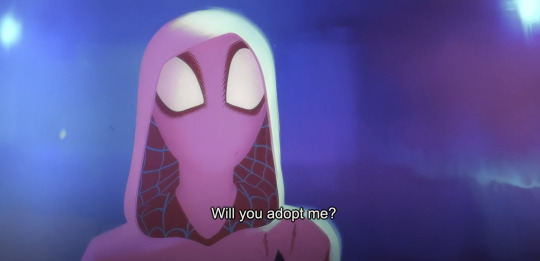
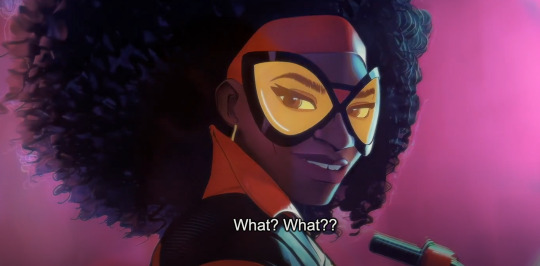
Now, do I think is this a joke? Yes, but I also think Gwen means it.
And look, this is not to say that you necessarily need to have two parents to raise a kid, I personally believe that one parent, if they provide the necessary attention and care to the child or children, could be an amazing parent and not let their kids feel like they are missing anything.
However, as discussed on this post, I mentioned why while George isn't a bad dad, sadly he is not the best parent for Gwen.
And here I also discussed why Gwen's mental health is a bit of a mess.
But to not sent people to do homework, let's give the cliff-notes version.
George is trying to be a good father, however between his job and his refusal to understand nuance, he has accidentally pushed Gwen away; even if maybe this could have been resolved if she talked to him in a normal situation, the fact that he did what he did in the beginning shows she was scared for a reason.
So that means Gwen has a gaping hole in what a role model and parent should be, since she needs more support. Of couse her Spidey identity is important to her (in fact she leans too much into it,) and having no one to help her on that complicated path doesn't make the situation any easier.
Enters Jessica Drew.
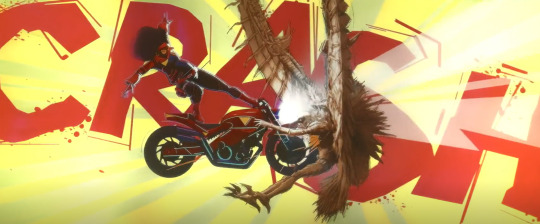
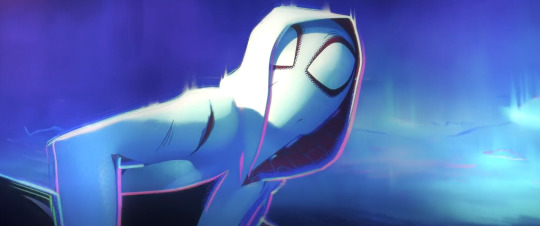
You know I found extremely telling that when Gwen sees Miguel, she is cracking jokes and not really taking his professionalism crap seriously; yet when Jess comes kicking ass with her motorcycle and she looks at her like she has seen the light.
Perhaps it had to do with her realizing this failed artist is more problematic than she expected, or the fact that Miguel was quickly disposed of by something she saw from a mile away; while Jess came putting the bad guy on a grinder and maneuvering a bike like nobody's business. Needless to say, Gwen is DEFINITELY impressed.
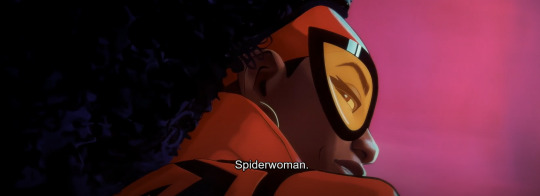
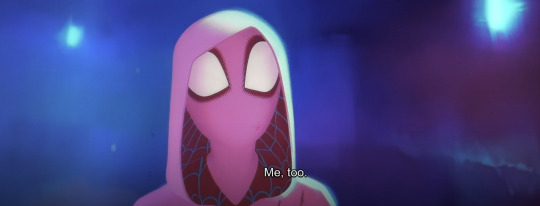
Once again, this plays almost like this is a dream come true for Gwen.
She hides it well for most of the movie as well as the previous one, but the reality is that underneath that cool exterior, this is a teenage mess with so much angst she is giving my teen self a run for their money.
Just like she craves companionship in the form of Miles as well as other spiders, she probably wants someone who can tell her everything is going to be okay or what they should do. Again, we may forget sometimes, especially with superhero movies where protagonists need to be competent despite their age most of the time; but Gwen is 16, 17 at the most; and has been handling this stress and turmoil for at least 3 years. That's a lot.
Top it with her dad not being able to emotionally support her, and the fact that she wants a mom becomes less a possible commentary about not nuclear families, and more of a likely possibility because the first 20 minutes of the movie gave us LOTS of material to show how mess up this is.
I think is a testament to the situation that she doesn't default to Peter B or Noir in the first movie, nor Miguel; she only seems to be interested in learning from someone when she sees Jess.
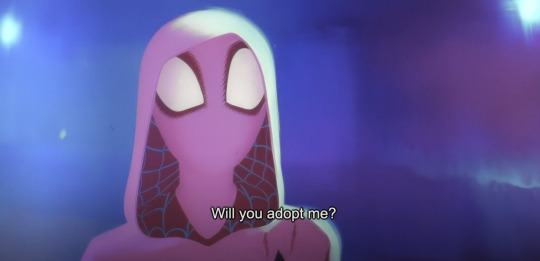
Is funny, but is also very painful to hear for me, as if you ask me she said it completely straight, and this just shows how much help she needs.
Granted Gwen said that accidentally and probably wouldn't have said it if thought about it first, but the fact that it slipped says a lot.
She desperately wants someone like Jess in her life, and to top it off, she probably wants that person as a maternal figure; probably someone to ask about techniques for defeating baddies and also who could talk about feelings without this person defaulting to work as a copy mechanism.
Feel free to call me crazy for getting so work up about a joke, but if I am honest other interactions really make me sell this idea for me.
Now let's talk Jess.
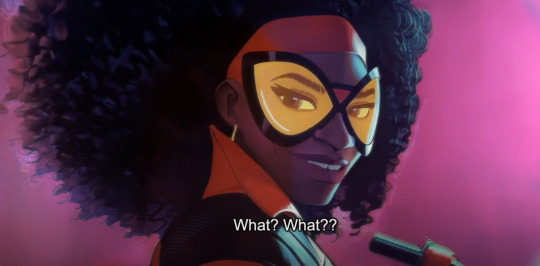
Literally what other reaction she was going to have.
We really never hear a definitive answer to the question, but I also think Jess didn't think too hard about it for a reason.
I am planning to go through some scenes of Gwen and Jess to dig deeper into their mentor/not-mom situation, but let's start with this.
Do I think Jess should have adopted Gwen? No, not at all.
Look I am a sucker for found family and adoption tropes, and I would had love nothing more than for Jess to give one dirty look at Gwen's dad, tell her she would be there for her, and take her away to a good home. That is not what happened, and I don't blame her.
She is on her way to having her own kid, she needs to be spider-woman and to top it all off, she seems to be kind of a second in command in a really big operation, where your boss is your friend who is also way too into his job and she probably is still there partially to make sure Miguel doesn't completely lose it. She has a lot on her plate as it is, adopting a traumatized teenager is a lot of work that shouldn't really be her job.
Do I think that means she has no responsibilities to Gwen? No, not really.
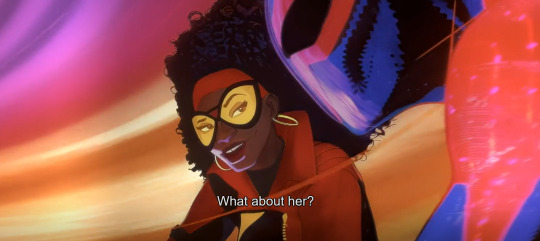
And this is largely why.
Okay, I will try to not go over every moment with them, as this is more about explaining their situation than a deep dive of every instance of their relationship, but this is a good kicker for the situation.
Jess immediately takes an interest in Gwen for the organization, now while I can understand that she based this purely on her abilities, I think a part of it was the comment Gwen made earlier. I think she sees in her someone who needs a steady hand and some support.
As a mentor.
This is going a bit ahead on the post, but let's establish that 1) This exists, and 2) Jessica got that idea EXTREMELY quick all things considered.
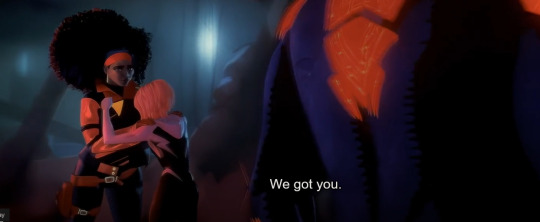
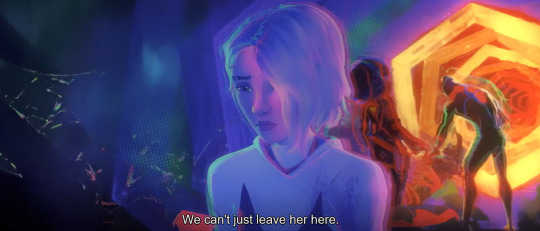
Here is where the responsibility part actually kicks in.
No, Jess doesn't have any responsibility to Mother Gwen in any way, regardless if Gwen needs one or not (she does,) but the moment she not only started to argue for her to have a spot in the organization, to take her in when the things in her universe technically imploded (which they are marginally responsible considering they came to clean this means and they only did it thanks to Gwen,) She implicitly accepted to look after her.
Okay here is where we need to talk a bit about tropes.
When you have protagonists that are teens or kids with powers, is inevitable that they will need to deal with dangerous stuff that no sane adult would let a real kid do, but is fiction so you kind of have to suck it.
This is a trope that I found kind of lazy even when I was part of the age demographic; which is why stuff like The Owl House with Eda was refreshing.
She was also a Mentor who was also not very responsible as a guardian, but she ended up growing into one, and even if she failed to protect her apprentice, she did try her damnest to do it.
Jess is not Eda, and she doesn't need to be, except that this story has proven to be aware that they are still teens.
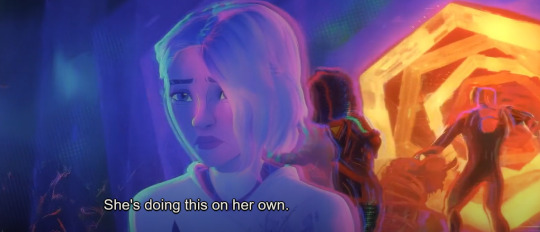
Jess clearly recognizes this isn't fair for Gwen. We also see something like this in the first movie, with Peter B worried about Miles can or can't handle, while still letting them do stuff you wouldn't catch me letting my little sister get away with; they know that there are somethings someone at that age shouldn't just be handling on their own.
And Jess isn't exactly ice-cold about Gwen.
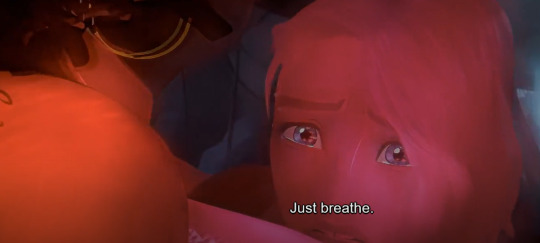
Jess took interest in Gwen's potential quickly, she looked after her, and quickly went to try to calm her down and support her during a very high tense and stressful moment. Even here is Gwen the one who ultimately moves away, not Jess, proving she could had try to stay close to ensure she was okay.
And this is something that shows that it kind of sticks.
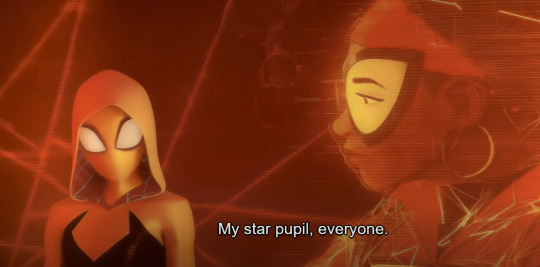
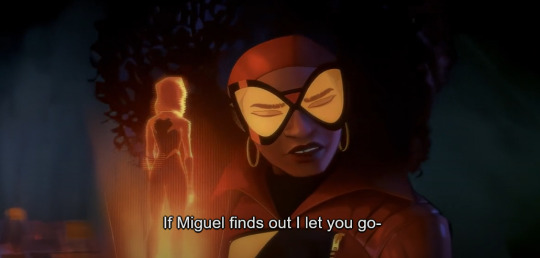
While considerably harsher here than in her introduction scene, Jess is showing that despite her annoyance with Gwen, she still likes her. She never thought her relationship with Miles shouldn't be a reason not to have her on the team; she trusted a mission in the universe despite that, and also calls Gwen her star pupil, which I don't was sarcasm.
She also gives her an hour to fix this, which even if not much, is more than she could have given her.
I am not saying that Jess didn't look after Gwen, or didn't care about her beyond what she could do for the organization, however, it wasn't what Gwen needed.
Let's circle back to responsibility,
Jess is aware of what happened with her dad, she knows what Gwen lost, and she can probably imagine that a kid that lost her identity and her world like that on just one night can't be doing okay; yet nothing shows me she ever did anything about it.
Here is the thing, Jess doesn't need to be Gwen's mom, but she can't just insist to have her and be her mentor, and don't think about checking on her in something other than her kicking-ass abilities. Even if she doesn't want to deal with it, she should have either seen how to make her father see reason, or lock her in the room with the spider-man psych.
Considering how things go in this movie, neither thing happens.
And it feels more painfully obvious when you see how much Gwen tries to appeal to her emotionally.
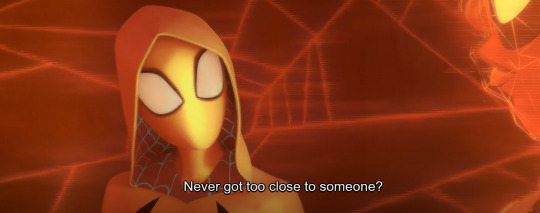
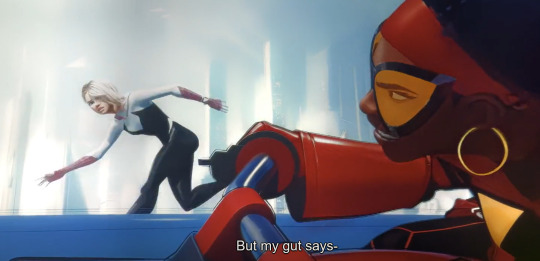
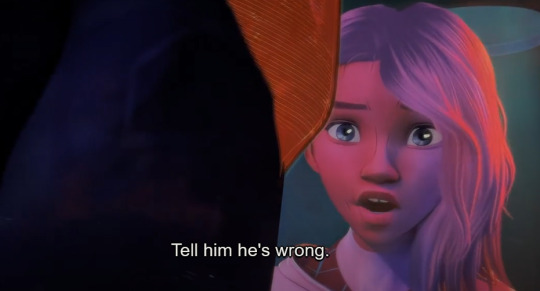
In a vaccum, none of these are a big deal, but the more I think about it the more heartbreaking this is for me to watch.
This is why I find these to be such a big deal: Gwen doesn't like to do emotional shit.
I know, I probably repeated that more times than I can count; but let that sink in contrast to what's going on.
After Peter died, she decided to not have any friends because she couldn't deal with the grief, with Miles only getting past that rule because they are both spiders plus chemistry. And even then, when you see Miles asking if she is going to talk to her dad, she decided to crack a joke and brush the idea as swiftly as possible.
When her dad tells her about the break in the spider-woman case, she tries to brush it off with false enthusiasm at first, and then when she gives a more honest response is more out of bubbling annoyance that truly her trusting him with something.
She isn't baring her heart open in these moments though, let's not have it twisted; however, she is trying to use emotion as a way to appeal to Jess, which is not her first move with most people in general. Even when she is not actively giving her an in-depth explanation, in each of those moments she is giving the emotional context as to why this is so hard.
"You never got too close to someone?" -> "This person is important to me and this is hard for me, wasn't it for you?"
"But my gut says-" -> "I know this looks bad, and I can't explain how, but this isn't right, trust me."
"Tell him he is wrong!" -> I don't really need to explain this one, do it?
She continuously looks up to Jess to hear her out, and to understand what she is going through; she sees her and expects someone who can connect with her on that level and care about it.
But that's not what Jess does, because she is not her mom, she is her mentor.
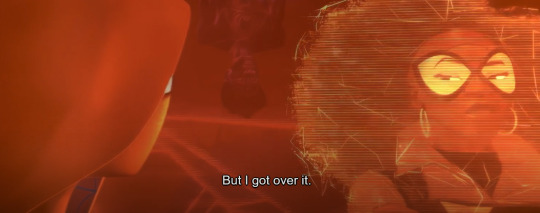
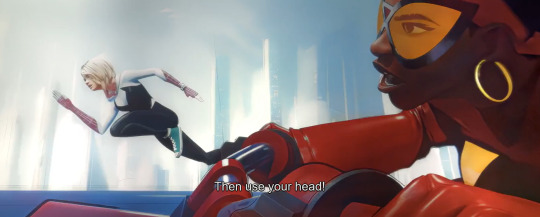
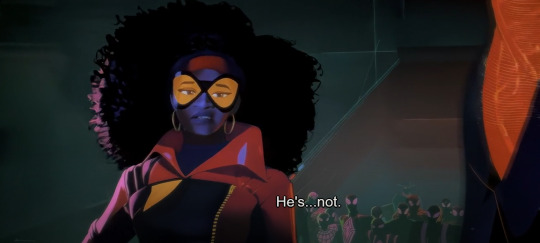
For the most part, when Gwen tries to appeal to Jess emotionally speaking, Jessica shuts that idea down fast.
Now, I am going to preface this by clarifying that in real life, a mentor would probably check emotionally on the kid they are mentoring if only for the fact that when you are in charge of a kid, you should look after them. Fiction however is another ballpark, and technically speaking, a mentor shouldn't need to be doing something that is the job of the family.
A good mentor would probably understand their apprentice position and listen, since regardless of your years of experience, you can't just underestimate people or you will inevitably be surpassed. However, Jess isn't trying to be anything like that; she wants to teach Gwen her way, and her way says that emotions are kind of on the way. So regardless if it isn't what Gwen needs, she will insist on that.
I think there can be a way to accept emotions but also don't let them cloud your decisions, yet again, Jess is not interested in that, and I Gwen actually have normal, supportive parents (or even just one,) I wouldn't be so hung up about this. But she doesn't and Jess knows this.
Superhero or not, Gwen is just a teen, and shouldn't need to be living this, especially because I freaking doubt this is a canon event or something; with the resources they have, and the people they have on board, I can't believe there isn't a way they could have talk to Captain Stacy and made him see reason.
But they didn't, because they are more worried about spider-man duties than whatever is going on to the person under the mask, and for them, this is just what comes with the territory so you have the suck it up. Even if this is perfectly avoidable once you think of it.
That's something that I had been thinking about a lot while doing my post on the organization as well as the one with Gwen falling in Mumbatthan. The spiders are stronger together, and in general working as a team gives them not only better chances at saving people, but also helping with the stress they have and being there for each other. That isn't the goal of the organization though.
Miguel's mission is to preserve the canon and to put people from other dimensions back into their respective ones, anything else is probably secondary to him. Sure, if someone asks for help from another Spider I don't think he would stand in the way; except if it is a canon event, which in that case, he will probably say to people to suck it up.
The pain they have, the trauma they are suffering, while being together helps it was never the end goal to help with that, and there is no regard in avoiding said pain. This is a job first and foremost, which is the attitude Jess has.
Gwen is not her kid, or even a young student, she is a coworker; one that she needs to guide a bit, but her subordinate at the end of the day.
Sometimes the waters get muddier, on both sides if I am honest.

I will touch a bit on other scenes, but I wanted to bring up this one in particular because there is something that feels a bit more mother-daughter than it probably has any right to show.
Now I will be the first to admit this may be a me thing, I can be very formal in real life and that goes double with people who are older than me and in a position of power over me, the only exception to that rule is my current boss because he is the mythical creature of being a manager who remembers employees are people too.
Gwen is not like that, she jokes and doesn't give too much of a shit regardless if you are Miguel or a bad guy. However there is something in the way Gwen acts that feels she wouldn't be phrasing stuff like this if it was Miguel on the other side; again, back to her using emotion as a first resource rather than as a lashing effect of her anger.
Jess, while being kind of no-nonsense overall, is also not the most formal, because this is the spider society and Miguel had the bad luck to be the only straight-laced one while everybody else tries to be a comedian for the most part. But there is a way that she talks to Gwen that for me feels kind of like her not fully keeping this professional either.
I can't fully put it into words, so feel free to not make seriously on this one, but there is something about the way Jess is commenting on the situation that reminds me more of a mom than any of my bosses.
Then we have scenes like this.
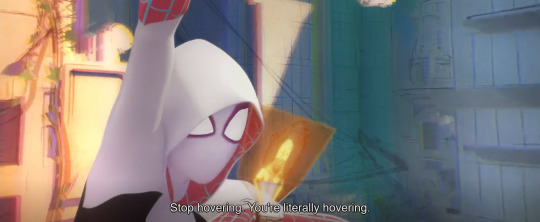
I am sorry but this part really first like is a discussion between mother and daughter, even with contexts the way the scene delivers gives that energy.
This isn't exactly wrong by itself, nor is it truly that surprising. The boss I mentioned before had also mentioned off-topic that me and my other coworker (who is a couple of years older than me,) are almost like his kids, and we share an age range. However he doesn't try to parent us really, and even if some of the comments are very much 'now listen to me kids' he quickly remembers we are adults and would drop topics or decisions we made that I know wouldn't be his reaction has been one of the kids that are actually kids.
It probably has more to do with the way they talk and see people younger than them that any parental feelings, and none of this is really inappropriate.
Nonetheless, the fact that Gwen craves that motherly bond makes these interactions hurt all the more for me.
Gwen may not be under the illusion that Jess is her mom, but she's subconsciously looking up to her, and the fact that Jess acts like this, even if by accident, just feels into that mentality. The mentality Gwen has that maybe Jess will listen this time, that she will take into account her feelings and her opinion in her decisions; but she continues to not do that.
For the most part.
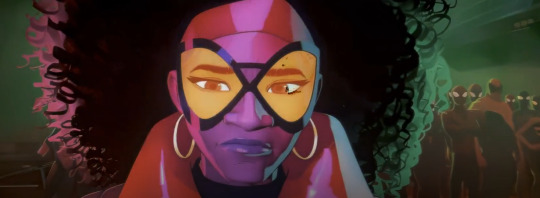
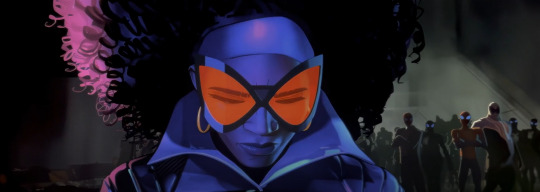
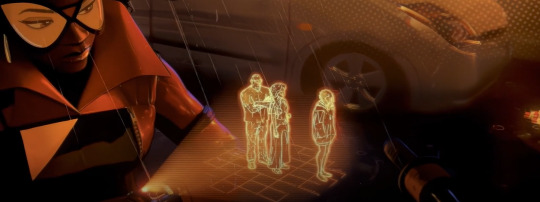
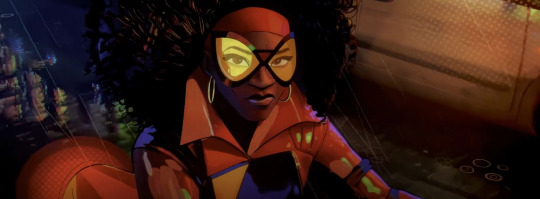
Is a bit hard to see with the resolution I have, but when Gwen is kicking and screaming while been taken by the machine, Jess's gaze goes in another direction.
I am sorry if this is feeling repetitive, I know this post is a long one (which is funny how this post created another 2 just so those topics wouldn't be here.)
What I am trying to say with all of this, is despite Jess' insistence this is just work, that Gwen is just her pupil and she can only do so much; Jess continues to have a soft stop for Gwen that let's her get away with things. Is kind of ironic how Miguel said Gwen was a liability for her feelings for Miles, yet couldn't even consider how feelings in general would get in the way, considering Jess assigned this mission to Gwen (which then she fumbled the bag and led to the Spot becoming an actual menace,) give her a second chance, and then apparently let her go.
(It is possible she is looking for where Gwen is going to tell Miguel, but I doubt it.)
I fully believe that by the third film, Jess will probably end up either switching sides or just letting Gwen do what she wants, and even if is the first scenario I think it would be via Gwen that happens.
But to wrap things up, if Captain Stacy is not enough as a parent for Gwen because he can't do that role properly, Jess isn't good enough as a parent for Gwen because she doesn't want that role, regardless of if she sometimes kind of acts like it.
I think their relationship is fascinating, and I would love to explore more of this connection in some way; if only because the complicated nature of it makes it all the more interesting for me, but in a nutshell, is this:
Jess: I wanted an apprentice, you wanted a mom.
Gwen: Well I guess we are both disappointed.
(Sorry I couldn't help myself, OOF I wish I could draw well enough for this.)
Now, with my thoughts on Rio, I could probably put them on this post because is not that long, but it will probably feel off with all this commentary I had been making, so it would be in another one.
If you got this far, congrats on your patience, and thank you for reading!
122 notes
·
View notes
Note
Adding to the Semblance discussion. It was REALLY uncomfortable when they said what Semblances meant and I realized what Adam’s represented especially when Blake talked about her own Semblance.
it did not leave a good taste in my mouth at all when Blake just said ‘his Semblance is like yours’. Not even touching on the implication of Jaune’s own Semblance manifesting as his literal desire to be useful to the point he is sacrificing his soul(they specified he’s boosting their Aura, not just healing.).
like…I fully expected an intervention or something but no.
On a less…upsetting note. Do you think in Volume 5 when Ruby said she unlocked her Semblance training, it was that moment in Yang’s trailer? One where Ruby bolted and tripped. Which made me go ‘Oh, so this is the moment she talked about!’. Always found it weird how no one mentioned it in discussions.
I think it helps a smidgen that Ren's lecture (from what I recall, anyway) makes it clear that not everyone agrees with the theory that semblances = innate aspects of who you are... but the problem is the show then went to treat it as a given, rather than just a dubious, perhaps self-fulfilling idea. However, if RWBY is going to commit to that 1:1 connection, then yeah, the writing needs to consider what semblances reveal about a person that perhaps needs to be addressed. The closest they've gotten is with Blake and I think that's a staggering failure because 1. Her clones are not solely used for running away (they fight back, provide distractions, combine with dust, etc.) 2. Other characters with similar semblances (like Sun) apparently don't have this same flaw despite the metaphor suggesting as much and 3. Running away isn't inherently a bad thing. I keep thinking about how Blake's biased perspective of her own semblance might have led to a more nuanced version of Volume 8. What happens when you take a character who originally thought that running was a horrific, cowardly act, only for her to realize over time that it's just another kind of combat strategy, one that's often necessary in a long-term war (something she's in a unique position to understand given her generational fight for equality) and then you set her up in contrast to her overly optimistic "We can do it!" leader when they're both faced with a no-win scenario? As the cynical, hardened, activist, "You have to know how to fight to survive outside the kingdoms" team member, I'd have loved to see Blake help Ruby grow as they face more and more complicated situations... not clasp her hands and gush about how she's always looked up to her (not actually). Semblances could have been a key part of all that, especially when you take into account that speed is also a useful tool for getting out of a tough situation. How often has Ruby used her semblance to get away from a fighter she knows she can't take on alone? Roman, Mercury, and the like? But that Ruby belongs to a former version of the story that wasn't upholding certain messages to the point of narrative nonsense.
I'm drawing a blank on where Ruby "bolted and tripped." Was that another short? I never saw Yang's trailer as the moment she unlocked her semblance though, if only because Yang has no reaction to it. She laughs a little and says, "Nice one, sis" which is not the kind of excited response we'd expect from a younger Yang when Ruby hits such an important milestone. I've always assumed we've never seen the exact moment Ruby unlocked it on screen, just heard about it in passing.
Although, in re-watching that moment I spotted this:
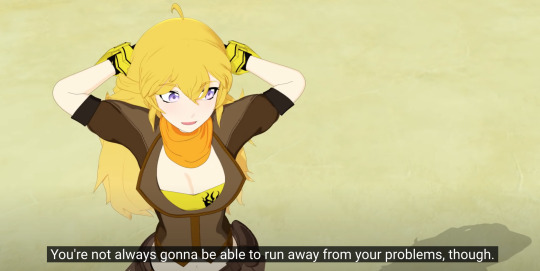
Far from being a generalized character flaw, the context of this is Ruby running from hand-to-hand practice when we've already established that she doesn't want to do this. That's another flaw the show introduced without considering how it fits into the larger World Building. Why is Ruby the only one who has the "problem" of not being able to fight without her weapon? I would have bought this if the show had simply framed it as an issue all Huntsmen face, but Ruby is in a unique position to circumvent it given her family's personalities and fighting styles: Yang is a brawler, Tai might have been similar, and we see that Qrow has no problem shrugging and throwing a punch when his own weapon is lost (Tyrian fight). Instead, RWBY acts like Ruby is the only one with this issue (Ozpin calling her out), she's apparently overcome this with a single hit (Haven battle)... and then it never comes up again. Despite the fact that Volume 9 has her lose her weapon and then be too traumatized to pick it back up for all of 30 seconds the hand-to-hand never returns as a satisfying, "Ah, good thing Ruby had that development and came from this family, otherwise she might be in serious trouble here!"
Hmm. You know, now I'm just thinking about an AU where teeny-tiny Ruby with the speed semblance is originally trained in close combat because do you realize the advantage you have with Petal Burst and your small stature? Besides, playing dirty in the name of survival is a Rose-Xiao-Long tradition! It's not until late in Signal that Ruby is deciding on her weapon and it's a damn struggle for her to wield such a massive scythe, but she's stubborn and is determined to follow through on her choice. So one day she looses Crescent Rose in battle and Roman thinks that's it, this kid only had "one of the most dangerous weapons ever designed" going for her and those stuffy Huntsmen are notorious for putting all their eggs in one basket, learning their fancy moves with their fancy, dust-powered weaponry and then it alllll falls apart the second they're forced to get their own hands dirty. Piece of cake.
...only for Ruby to kick his ass with arms like steal from wielding a weapon that weighs as much as she does, the ability to slink her way under any guard, a speed semblance that can take her behind her opponent in an instant (trailing petals as a distraction to boot), and years of training under Tai, Yang, and Qrow—all of whom really like punching things.
Ruby: What? Did you think I needed Crescent Rose? That's stupid...
Yang: 👏👏 😎 👏👏
Blake, who also harbored those assumptions about Signal-trained Huntsmen because like many of their enemies she comes from a culture where you fight with whatever the hell you've got on hand: 😍
Weiss who DOES need her weapon to enact any kind of damage because she's been taught that any fighting that could so much as muss her hair is a big, cultural no-no and she's just beginning to realize that maybe that ignorance/aversion is a bit of a liability:

37 notes
·
View notes
Note
silver and i were discussing the ethics of physical restraint in medical situations and we were wondering what your opinion is?
obviously i'm super biased, i know that it can cause a lot of trauma and isn't very efficient anyway. i can reluctantly admit that it might be best if the patient is too out of it/violent/dying. in trust fall, legend's injuries aren't life-threatening, he's fighting back out of self defense, and he's very much aware of what's happening and already has major trauma from this happening before. so the medic would say that he was in the right, even though he wasn't.
but since you actually have to be on the other side, when/why do you decide that physical restraint is the best/only option?
Physical restraints are definitely a complicated issue, for sure. I was actually just dealing with this last night. In the specific context of Legend's situation, if I had a patient who was injured but not dying and who was actively trying to hurt me I'd just stay the hell away and let him bleed lol, I ain't getting myself beaten up over that. He'd probably get arrested for trying to hurt me, though, because if I were doing an EMS call and my patient got violent I would call PD, they're our guardian angels whether people like them or not. I usually try to de-escalate situations before they get to that point, but my and my partner's safety is higher priority than the patient's - that's how we're all taught. We can't help anybody if our patient knocks us out. If Legend had just said "I'm fine, please leave me alone" and sounded terrified the correct response would be to try to talk to him and when it became clear he wasn't going to let anyone touch him then maybe leave supplies with him, talk to someone who he trusts to take care of him, and leave. We can't force care on someone who's with it, they have a right to refuse.
But in general with restraints, it's... not something we try to go for as a first choice. Situations can be difficult - there's a huge difference between someone who's injured but with it and isn't dying vs someone who has a head injury and therefore is out of it, or someone who is suicidal and will hurt others who try to stop them, or someone who's high as a kite and frothing at the mouth going insane on drugs, or someone who's delirious from extreme illness and fatigue. Last night I had a patient with meningitis who was so freaking out of it, dude kept trying to pull out his IVs and he was receiving life saving treatment through them, kept trying to pull out his feeding tube and he'd starve to death without it, kept trying to get out of bed and he'd fall and hurt himself if he did so - not to mention he had a lumbar drain, which if that gets dislodged can lead to paralysis and death. So clearly he needed to be kept in line. However, he was also redirectable - he was confused as hell but he wasn't violent. If you told him he was safe, told him where he was, and said he needed to rest, he eventually settled. So while my provider offered to give me the option of using restraints on him, I declined - he had a sitter who could redirect him, and honestly I felt the restraints would agitate him more in his state. Another patient on the unit, however, was confused as hell and tried to lunge at a nurse to hurt her. He got restraints and a sedative, and he slept though the night just fine. Yet another patient in the ICU had hit multiple nurses multiple times before the providers finally let us put restraints on him - and that guy was with it, he was just being an ass. It's a nuanced thing. I think they're necessary but only in special circumstances.
25 notes
·
View notes
Note
Hmm...I dunno.
I feel like something that's been bothering me is that I feel like RWBY is as much about questioning the idea of treating life as a fairy tale.
When we hear about Fairy Tales, as is portrayed by RWBY, it's sometimes seen as either a silly fantasy, or as a necessary morality tale, or as a righteous path to be followed.
Or in the case of Ozma, a means to try to piece together and frame his life and the neverending misery he's in.
But the point about RWBY I've come to the conclusion about is that it's a story that actively questions why we treat people's stories as a fairy tale AT ALL.
Not every story should be so black and white, or at the least it shouldn't be treated so black and white. And it feels like the story is going out of it's way to question why we're so keen on shoving the story into the narratively black and white moral framework of a fairy tale, when it's plainly clear that life isn't a fairy tale at all.
Life is consistently portrayed as messy, complicated, where people can take the wrong meanings from other people's stories, or find inspiration in ways that can be seen by others as overlooking the complicated nature of what really happened.
Take Pyrrha. Her mom framed her ultimate sacrifice as something positive, that she knew what she needed to do and everything.
But the actual Pyrrha was a complicated mess of a person who was put into a terrible situation where there wasn't really a good answer at all. It was no fairy tale, but a tragedy where the moral wasn't straightforward, if it existed at all.
Fairy Tales boil things down to easy morality tales with good and bad examples, while often times conflating or removing the nuances of the situation entirely.
I dunno if I'm doing a good job explaining this or not.
With that in mind, reducing Neo's situation (and arguably even Salem and Cinders' situation) to being a bog-standard "they will be proven completely wrong and used as the bad example in a fairy tale" situation doesn't sit right with me. Because I think the actual situation is going to be substantially more complex than we give it credit for.
Oh it's definitely going to be more complex. It's Neo herself who will simplify it, because that's what she's always done. She took the entire millennia long battle between Salem and Ozma and turned it into her personal revenge story. She repeatedly refuses to consider other people as their own agents and not supporting characters to her protagonist. So of course she's going to decide she's The Hero and ironically condemn herself to the role of minor villain. It's what she's always done.
And while RWBY is more complicated than fairy tales, it is not a stranger to bad examples. Pyrrha dying because she went off on her own, Ironwood dying because he tried to hold up Atlas alone, Ozma dying over and over and over because he wouldn't trust people. The moral of how dangerous it is to see yourself as a lone hero is repeatedly stressed. And I highly doubt Neo is going to break the streak, especially since she's effectively used her Semblance to become her own friends and cut off everyone else. Her character arc and the tone of the story don't support her suddenly getting to cheat her way past the character development the tree demands.
29 notes
·
View notes
Text
Rewatching Kinnporsche is like:
First time: ew Vegas.
Second time: ooooh he’s pretty. I love him. I want him to run off into the sunset with Pete. He deserves his happy little family and a partner who’s into his kinks.
***
First time: Pete is such a goofy weirdo. I love him tho.
Second time: He’s a badass, omg. Pete sees things. He owns the bodyguard shared brain cell and only lends it out when necessary.
***
First time: vegaspete? wtf? this makes no sense. When?
Second time: ohhh Pete’s been fighting his attraction for awhile. Shiiiiiit. I mean. He almost melted into a puddle when Vegas touched his clothed back. And some of those looks he flashes Vegas in ep 10? Damn.
***
First time: vegaspete. I don’t get it. I don’t get it. But I don’t have to get it. That’s okay. I love them.
Second time: I still don’t get it, but I can see how it works now. I love them so much, and when they’re soft together, I fall to pieces. Pete’s afterglow smile, istg, how are we supposed to survive that? I’m melting.
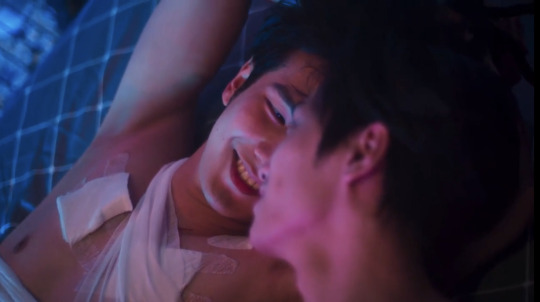
This is some fucking romance right here.
***
First time: Vegas is evil and manipulative (and yes, much of that is caused by his father and the animosity between the families, but it’s not an excuse).
Second time: He’s much more complicated than that. It’s still not okay, but there’s so much more depth and nuance there than I originally thought. He’s trying to please an unpleasable father in a situation that is designed to make him fail, and somehow, somehow, this is his fault. He can’t win. No one expects him to win. No one wants him to win. No one has ever supported him. No one sees him. No one sees how he’s been formed by this toxicity. No one recognizes that he is also a victim.
Except Pete. And that leads to…
***
First time: Does Vegas actually care about Pete? After hitting on/trying to seduce everyone else, how genuine are his feelings? Can we trust this?
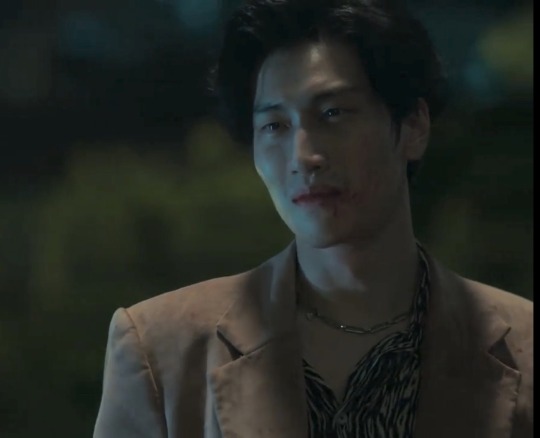
Of course, it’s answered in ep 14, especially when he turns around…his face, wow. Yay for genuine, but—
Second Time: It was obvious much sooner than that. He’s so vulnerable around Pete. He lets his guard down, which is why Pete can see through the bullshit. The soft smiles when no one is looking (that one when he’s reading while Pete eats his noodles, just damn. That smile is for himself alone. There’s no one to impress or convince or manipulate. It’s fucking real. MY HEART).

Cooking for Pete. Listening to him, actually hearing his words and taking them to heart. Allowing Pete to comfort him. It’s so obvious in the journey of his facial expressions. Vegas is IN LOVE, and (the part that makes me lose my mind)—
It’s bc Pete doesn’t want anything from him. He’s literally powerless, and he asks for nothing. Everyone needs/uses Vegas for their owns means. He’s a weapon, a tool for others, someone expendable. Pete wants nothing and yet HE OFFERS COMFORT ANYWAY. Pete’s actions are so selfless that they take Vegas so completely by surprise he doesn’t know what to do with himself. Vegas has found someone he can trust, who loves him, and is into his kinks. With that onslaught, he doesn’t stand a chance.
And that’s why this moment is so huge!

Bc once again, EVERYONE wants something from him. He has nothing left to give. He’s willing to let Pete go bc he loves him, BUT Pete, who has never wanted anything from him, doesn’t give a shit about that. He wants Vegas. That’s all. That’s enough.
And I’m so emotional about it, omfg. Never gonna recover from this. THE ROMANCE. screaming crying throwing up. tears everywhere.
(Side note: just what a master class of acting these episodes are for Bible, geez).
***
First time: Vegas better be the bestest best boyfriend to ever boyfriend or the combined major and minor family (and me) will be coming after him. Pete deserves the world.
Second time: still same, haha. (Only perhaps even more vehemently)
***
Is it too much to ask for domestic, happy vegaspete with no violence or manipulation in season 2?
#well this got out of control and is significantly longer and less funny than I planned#oops my emotion ran away with me but seriously how can they not?#kinnporsche#vegaspete#soft vegaspete makes me melt#kinnporsche rewatch#I’m probably gonna do a kinnporsche one bc I love those romcom idiots so much
110 notes
·
View notes
Text
わけ - definition (2)
What does ~わけ mean?
The same post in much higher quality is here
In this #Japanese with anime post, we will take a closer look at a mind-bending structure belonging to the realm of modality and, unfortunately, is usually omitted in translation. It's not that it has to be omitted; it happens that English just sounds better or makes sense without it (in most cases).
Examples in this post are from Jujutsu Kaisen Season 1 and Season 2.
Extra grammar:
というわけ vs. わけ
わけ vs. から/ので
Before we dive in
わけ is truly a mind-bending structure, and knowing just the dictionary definition is not usually enough. The examples provided in textbooks seem to be okay at first glance, but when you start analyzing and comparing わけ to other structures and grammar points, you quickly realize that you haven't fully grasped the concept it actually represents.
Long story short, though. In a lot of cases, わけ can be translated to 'so' or 'then' (: as a necessary consequence; Merriam-Webster).
However, in many cases, English translations don't need to include 'so' or 'then' because things can be simply understood from the context. As readers, we don't need extra lexical help to understand that something is a consequence of something else. The brain fills in that information naturally on its own. Japanese, though, decided that having extra lexical help could be useful.
Note: This article doesn't explain the meaning of structures like わけにはいかない or わけではない. They do have their English equivalents.
I also managed to compile a short list of things that literally enlightened me while struggling to understand what わけ really means and why we need it to sound natural.
In many contexts, わけ indicates that the partners in the conversation share some knowledge.
You really need context to be able to use it. If you were to just enter a room and say a sentence containing わけ, it wouldn't make much sense.
It is used as a reaction/to react to someone else's statement (dialog) or to your surroundings. It shows that you have realized/understood something. Could be paired with だから, それで、なるほど, which are placed at the beginning and わけ at the end, for example:
だから、五条先生強いわけだ。
Ah, so that's why Gojo-sensei is so strong.
Context: We were wondering why Gojo is so strong, and we just found out (someone told us) that Gojo is a six-eye user, and that made us realize why he is so strong.
It is used when the speaker performs a monologue. In this case, we can distinguish two possible situations:
emphasizing inevitable consequences of some actions, i.e. You eat a lot of sugar, so naturally you will gain weight. If you don't add わけ to such a statement, it will be fine as well, but it will sound like a dry fact. However, during a lecture or a conversation about eating habits and their consequences adding わけ will give your sentence the nuance of "And as you know...".
the speaker wants to restate/sum up their own words because their first explanation was unclear. It's like saying "I mean..."; "In other words..."
It is used to restate/paraphrase someone else's words (or your own words). Could be paired with つまり. For example, someone described something to you, but it was complicated. You want to make sure you understand the statement correctly, so you paraphrase it using easier words. You will end that 'easier' sentence with わけ or というわけ.
Used to give the reason for what the conversation partner has said or to state the logical conclusion. Remember that both parties in the conversation need to have the same knowledge. For example:
「田中さんが亡くなったそうだ。」"
I have heard that Tanaka-san has died recently."
「本当?心臓発作だったというわけだな。」
"Really? That must have been a heart attack." (source)
Context: Both of the speakers knew that Tanaka-san had some heart problems, and one of them drew a logical conclusion.
わけではない is used for correcting false impressions
In English, the tone of your voice and intonation will change the meaning of your sentence. In Japanese, though, such changes can be expressed through particle/verb ending choice. A good example can also be ~てしまう.
Consider this sentence:
I didn't invite him to the party because I didn't like him.
It could mean either:
1. I don't want to party with people I don't like. (から)
2. I had other reasons not to invite him, and not liking him wasn't one of them (わけではない)
Even though there are ways to translate わけ into English, it's often omitted in translations.
'Because ' in English is used to provide reasons, but it doesn't really matter if your conversation partner shares knowledge with you. 'Because' can convey completely new information or information already known to everyone for clarity's sake. わけ, on the other hand, speakers must have some prior, common knowledge.
In the following parts of the article, you will find more information related to the above points.
Definition of ~わけ
According to Jisho, it is a noun, and because it is a noun you negate it as a noun, and it conveys the meaning of:
conclusion from reasoning,
judgment or calculation based on something read or heard;
or it just translates to (as a standalone word)
reason; cause; meaning; circumstances; situation.
Stefan Kaiser in his book Japanese: A Comprehensive Grammar defines わけ as
a structural noun [...] used when the speaker realizes that there is an explanation or reason for some occurrence or phenomenon. Or [...] used when the speaker realizes that some fact or occurrence is the result of some other fact or occurrence.
The author mentions that it can be translated to 'so' or 'then'.
Following this definition, let's analyze our first example from Jujutsu Kaisen.
JJK; S01 episode 02 or 03; Yuuji just moved into the school dorms
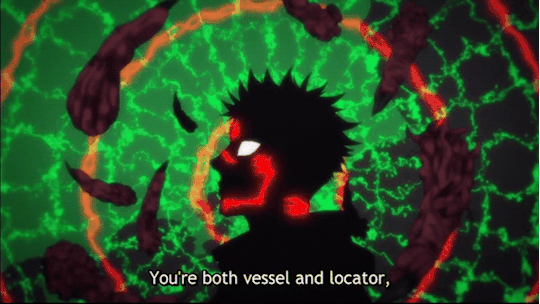
君の中の宿儺が力を取り戻すために指の在り処を教えてくれる. 君は器である同時に探知機、レーダーでもあるわけだ.
To regain its power, the Sukuna you consumed will direct you to the whereabouts of the fingers. You are a vessel as well as a radar.
To better understand this sentence, let's look at more context.
Yuuji has already eaten two of Sukuna's fingers. Since the fingers resonate with each other, he can kind of guess where they are or at least sense their presence (to some degree). Given those facts, we can surmise that Yuuji works like a radar, and that is what Gojo implies by using わけ.
In essence, わけ marks a logical conclusion or result based on some known facts.
Some known facts: Yuuji ate the fingers, they resonate with each other, and he's a vessel...
The conclusion from reasoning/realization: ...you’re a radar.
Notice that the English translation did not include any phrase that would introduce 'conclusion'. It is implied. You could include, for example, 'And that's why...' or something along those lines, but the whole line sounds better without it.
Let's elaborate on it, though. For those of you who don't overthink life or grammar rules, such short dictionary entries might be enough, but I'm a professional overthinker and I just need to know.
~わけ as a modal structure
This section is full of proper linguistic discourse, but don't shy away from it. It might actually help you deepen your understanding of this structure. Japanese grammar books for teachers, and grammar books written in Japanese, list わけ as a modal structure.
For a complete guide to modality, go here ⇒ Link Click
Modality is about a speaker’s or a writer’s attitude towards the world. A speaker or writer can express certainty, possibility, willingness, obligation, necessity and ability by using modal words and expressions. Speakers often have different opinions about the same thing. (Cambridge online dictionary)
Simply put, modal structures help you convey a variety of subjective nuances, for example, instead of saying, I'm wrong, you can say, I might be wrong (might is a modal verb). Let's see what subjective feelings わけ helps us convey:
Certainty or Conviction: わけ is often used when the speaker is confident or certain about the reason they are presenting. It signals that the speaker believes something is true based on their understanding or recognition of a situation.
Explanatory or Justificatory: It is commonly used to explain or justify a statement or action. It adds a sense of "it makes sense that..." or "therefore..." to the statement, showing that the speaker is not just stating a reason but also expressing their conviction or perspective on that reason.
Subjective Interpretation: わけ reflects the speaker's subjective interpretation or understanding of a situation, making it a modal structure because it conveys the speaker's attitude and belief.
An interesting observation has been made in an article titled 「わけだ」文と「からだ」文の意味の違いについて by 牟世鍾 and 宋洙珍 (I'm sorry, I can't decipher their names).
「わけだ」文が表す理由は、対象から納得し、それを理由として位置づけたもの、つまり、話し手が何か認識の過程を経て位置づけたまさにモダリティの形式であり、そのような認識․納得の過程のない直接的な理由を表す「からだ」文とは異なっている。
Which roughly translates to:
The reason expressed by the sentence わけだ is that the speaker is convinced by the object and positions it as the reason, that is, it is the very form of modality that the speaker positions through some recognition process, which is different from the sentence からだ, which expresses direct reasons without such a recognition/convincing process. (translation: mine)
In summary, the passage explains that わけだ places emphasis on the speaker's mental activity by which they become aware of, identify, and understand something (recognition). It involves perceiving, acknowledging, and comprehending information or stimuli in a way that leads to an understanding or recognition of a particular fact, concept, or situation. からだ, on the other hand, is more direct and simply states the reason without highlighting the speaker's internal thought process.
The article also states that
納得の形で提示した理由の文、つまり「わけだ」文は「からだ」文に置き換えられるが、その「からだ」文は「わけだ」文が持っているモダリティ的な意味はなく、単なる理由を表す文になってしまう。
Which translates to:
The statement of reason presented as a form of belief, i.e., the わけだ statement, can be replaced by the からだ statement, but this からだ statement does not have the modality meaning of the わけだ statement and becomes a mere statement of reason.
"A mere statement of reason" refers to a straightforward and explicit connection between the cause and reason; there's no room for confusion or subjective interpretations. Modality, though, is all about subjective interpretations.
For example, in the sentence "I'm late because of traffic," "because of traffic" directly links the cause (traffic) to the effect (being late), making it clear that traffic is the reason for being late. There is a straightforward connection between the two elements.
Okay, let's leave modality and that linguistic talk and move on to something lighter. However, continue reading this article to find out what is the best possible interpretation of Gojo's わけ.
A learner-friendly definition of わけ
After many talks with my Japanese teacher, we managed to pinpoint some reasons for using this structure and what speakers want to convey by using it. Our main goal was to determine why in some cases わけ is a much better option than から.
Let's go back to our Jujutsu Kaisen example:
君の中の宿儺が力を取り戻すために指の在り処を教えてくれる. 君は器である同時に探知機、レーダーでもあるわけだ.
To regain its power, the Sukuna you consumed will direct you to the whereabouts of the fingers. You are a vessel as well as a radar. (official translation)
In this case, and as you will see in other examples, わけ most likely conveys:
general/obvious statement. It means that all parties involved in the conversation share the same knowledge and the speaker just confirms everyone's understanding.
the speaker indirectly (through わけ ) asks "You understand, right?" / "You know what that means, right?"
Gojo realizes that Yuuji has enough information to understand his situation, but may or may not know the implications. Yuuji may not know/be sure what all of this means.
Gojo first provided Yuuji with a result and then he stated the reason why achieving this result will be possible. This can also give わけ the meaning of "So no wonder why you work like a radar."
In essence, わけ is used when there is shared knowledge about the situation and the speaker reinforces/confirms everyone's understanding, even when not prompted to do so.
If we replace わけ with から, we will end up with a sentence conveying completely new information to Yuuji. The context of this sentence would have to be different as well.
The original context involves Gojo walking Yuuji around the school and talking to him about the jujutsu world and Yuuji's position in all of this. Yuuji did not ask any questions during their walk, as some things had been explained to him before.
However, if Yuuji was oblivious to his situation and what having eaten the fingers meant for him and the jujutsu world, Gojo would have to provide him with some dry explanations/facts.
The important factor here is 'being oblivious/not knowing enough'.
Let's replace わけ with から then.
[...] 君は器である同時に探知機、レーダーでもあるから。
To regain its power the Sukuna you consumed will direct you to the whereabouts of the fingers. Because you are a vessel, a locator as well as a radar.
In English, it still might make sense, but as I mentioned at the very beginning, わけ is often omitted in translation. In translation, we call such cases 'problems with equivalence', which means that one language has something that the other doesn't have or doesn't use it as often as the first one.
If Gojo used から, it would imply that Yuuji didn't know that he was a vessel, that the fingers resonate with each other, and therefore he could be of help to everyone.
The exchange between them could look like this:
Gojo: In order to regain its power the Sukuna you consumed will direct you to the whereabouts of the fingers.
Yuuji:Why? / How come?
Gojo: Because you are a vessel, a locator as well as a radar.
Let's analyze another example from Jujutsu Kaisen.
Nobara just joined the team; S01; Ep03
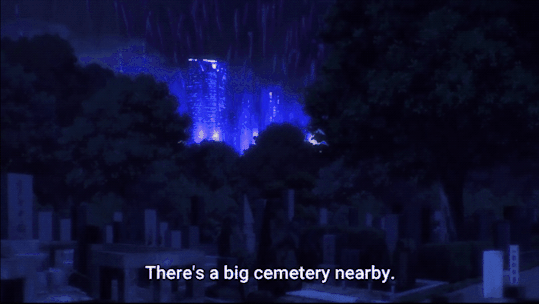
でかい霊園があってさ、廃ビルとのダブルパンチで呪いが発生したってわけ
There is a big cemetery, and the double whammy with the abandoned building caused the curse.
(again, no English equivalent of わけ)
というわけだ / ってわけだ are just more elaborate ways to express logical conclusions. It's often used with な-adj and nouns. There's a separate section on that, too.
In this case, Gojo gave our main trio two reasons why the curse might have shown up in the abandoned building. The building and the nearby graveyard are those reasons.
If we were to explain the use of わけ here in linguistic terms, we could say that わけ is used to emphasize that the occurrence of the curse is the logical result of the combination of two factors: the large cemetery and the abandoned building. It suggests that there's a logical connection between these two elements that led to the curse. It also adds a sense of logical inevitability.
However, explaining it through our 'learner-friendly definition' we could say that Gojo used it because:
all of them share the same knowledge, namely they all know why curses are born and what the combo of an abandoned building and a graveyard means (general/obvious statement).
It's not like they pulled up to the building oblivious to the world around them, and Gojo had to teach them the basics. Even though they did not ask any questions, he was confirming their understanding of the situation through わけ.
Gojo through わけ also implies something along the lines of "And as you can see..." or "As you probably already realized..."
It could also be the case that they immediately realized that the curse was there, but they didn't know why/weren't sure why. Gojo did not waste time, and instead of waiting for their questions, he supplied the missing information himself.
If we modified the sentence with から, it would still indicate that the curse occurred because of the combination of the large cemetery and the abandoned building. However, it would imply that the main trio didn't know that the connection between the curse being there and the vicinity of the graveyard and abandoned building mattered.
The conversation could go like this:
Gojo: There's a curse in this building.
Them: Why?
Gojo: There is a big cemetery, and the double whammy with the abandoned building caused the curse.
One more example from Season 1, Episode 2.
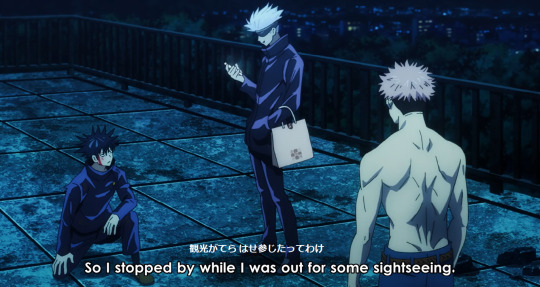
さすがに特級呪物が行方不明となると―上がうるさくてねえ 観光がてら はせ参じたってわけ
As one would expect when a special-grade cursed object goes missing, the higher-ups won't shut up, so I stopped by while I was out for some sightseeing.
In this case, 'so' perfectly captures the meaning of わけ, as Stefan Kaiser pointed out in his book.
A missing special grade cursed object is a big deal and sorcerers shouldn't take such cases lightly, which Gojo points out to Fushiguro, namely "[...] the higher-ups won't shut up."
Both Gojo and Fushiguro know about it as they belong to this community, which means they share knowledge.
While Gojo is telling Fushiguro why he came, he isn't providing him with new information. In this case, わけ has the nuance of "So you probably realize why I am here."
Because they belong to the same community, Fishuguro understands that ignoring special-grade cursed objects isn't the best of actions, and Gojo just reinforces/confirms his understanding.
One example from Season 2, Episode 8
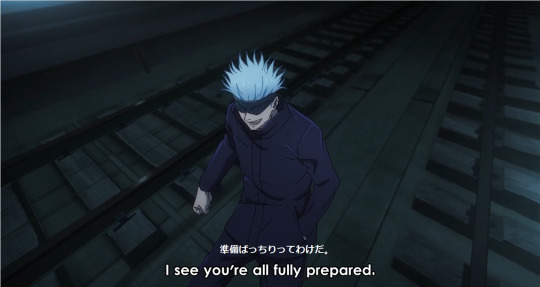
準備ばっちりってわけだ。
The presence of わけ in this example might not be so clear at first glance. However, the English translations official and unofficial alike somehow manage to capture the meaning of わけ through "I see," which by many learners is instinctively translated to なるほど, though.
As always, we need more context.
Gojo since entering the Shibuya station began to collect information about the situation. He noticed some things that helped him understand/realize what was going on, namely his opponents (Jogo, Hanami, and Choso) prepared for the fight with him.
Through わけ, Gojo shows his realization. At the beginning of this article, I mentioned that わけ can be used as a reaction to someone else's statement. In this case, Gojo is not reacting to someone else's words, but to his surroundings.
In an alternate situation, Jogo or Hanami could also tell him: "Hey! We did this and that!" And Gojo could reply with: "Is that so? It means that you prepared yourself then" (drawing a logical conclusion/natural consequence).
So let's summarize what we have learned about わけ so far.
わけ is a modal structure, which means that the statements marked by it aren't facts but opinions/beliefs/thoughts.
It can be used interchangeably with から, but the nuance changes, and in some cases the meaning.
It marks logical conclusions, which by nature aren't hard facts.
It can also be used to give advice or make general statements based on a logical conclusion.
というわけだ is a more formal and elaborate way to provide a conclusion because there are more reasons stated and this helps us summarize everything.
わけ is used to explain the reason or cause behind something. It helps clarify why a certain situation occurred or why someone did something.
It is often used to provide an explanation or justification.
All parties involved in the conversation share some knowledge / have the same information.
You can't really use it without context, as opposed to から, which can be used without any context.
It conveys the nuance of "As you probably already realized..." or indirectly asks, "You understand, don't you?"
というわけだ / ってわけだ for restating some facts
Apart from というわけだ / ってわけだ being a "more elaborate way to mark logical conclusions", it can also be defined as a structure that paraphrases someone else's or your own words.
わけだ and というわけだ don't really change the meaning of the sentence, but というわけだ is used when the speaker provides more than one reason for something. It is often used with な-adjectives and nouns as opposed to わけだ, which is often seen after verbs. It's not a hard rule, though.
What does paraphrasing mean and why do we do that?
Paraphrasing means that you're trying to use your own words to show how you understand someone's statement. You have analyzed someone's statement and you drew a conclusion.
We do it because we are not sure of our understanding; in a way, we're asking our speaker to confirm our understanding. Modal meaning applies here as well.
In the previous examples, Gojo wasn't restating someone else's words. He was the one to introduce the information.
However, in the example below, Principal Yaga is restating Yuuji's reasons for joining the jujutsu world.
The interview with Yaga; S01; Ep02
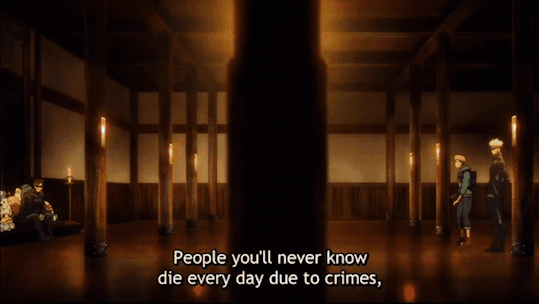
それが呪いの被害となると看過できないというわけか
Yaga just asked Yuuji why he wanted to join the jujutsu high school. Yuuji told him that leaving Sukuna's fingers as they are (unprotected/unsupervised) is dangerous. Yaga drew a conclusion from that, namely:
JJK; Chapter 3; Viz Media

In this case, we actually have something that is considered the equivalent of というわけだ namely, "So you're telling me that [...]". However, remember that not every "so you're telling me that..." needs to be translated to というわけだ.
In the very first chapter, the very first thing Fushiguro says to Gojo is, "You're telling me that someone is keeping a special-grade cursed object in a place like this?!" Fushiguro wasn't restating/paraphrasing Gojo's words.
We can assume that before this panel Gojo told Fushiguro: "There's a special-grade cursed object in the outdoor thermometer box." Fushiguro saw it and just repeated Gojo's words in disbelief, it was sort of a quotation.
Translation problems
In the above examples, わけ could be translated to 'so' or 'then,' but the aim of translation is to make sentences in the target language sound as natural as possible. We could rephrase all of them and include 'so' or 'then' or even any other synonyms, but if the context is clear enough, then including extra lexical help is simply redundant.
Here, we're also dealing with audiovisual translation, where the number of characters in a single line of subtitles matters a lot. Too many words in a single line may hinder the understanding or slow it down and lower the overall experience. And yes, even such short words as 'so' can do it.
Sources
https://briefjapanese.fun/how-to-use-wake/
my Japanese teacher and his native Japanese teacher
Stefan Kaiser, Japanese: A Comprehensive Grammar (p.285)
7 notes
·
View notes
Note
hi, i've been having some issues with Fi vs Fe, especially when I think of Aang in ATLA. I know he is typed as ENFP including by you. and i can understand the Ne dom view but the Fi is so confusing. I thought Fi was internal moral/values and doing what someone thinks is right according to themselves but in the show Aang kept saying stuff like 'the monks taught me revenge isnt good' etc. it always seems like his morals come from others in this way and not from himself? how does it work?
This confusion is common for newbies. It sounds like you're reciting a simplistic and stereotypical description of Fi that doesn't tell you anything about the many possible ways Fi develops in real people or how it actually operates in response to real world situations. There are several problems to address:
1) Applying imprecise and/or incorrect definitions: Fi is basically using your subjective feelings to make value judgments. That's all. It doesn't determine exactly what your moral beliefs will be or whether your moral belief system is valid. To understand how people come to adopt and justify their moral beliefs, you have to introduce the concept of moral development. Moral development and personality development are separate, though they have a complicated relationship.
In short, you're conflating cognitive functions and moral development because you haven't really understood what cognitive functions are and how to define them properly.
2) Not distinguishing well between cognition and behavior: How old is Aang? Physically and mentally, he's a preteen (10-12). Preteens do not have a well-developed auxiliary function, nor would they be very far along in their ego and moral development. He hasn't had the time and life experience required to develop a sophisticated awareness and nuanced understanding of his feeling life. Thus, with his "primitive" Fi, he only knows when things don't feel right, at best.
On top of immature Fi, a preteen isn't capable of refined moral reasoning, either. He doesn't yet possess the necessary intellectual tools for articulating his moral judgments and decisions. Thus, when pressed, what else can he do but call up some words from his mentors and teachers, as all children do at that stage of moral development? He's picking and choosing their moral arguments as necessary to help explain and justify his own strong but fledgling moral instincts.
Additionally, remember that people fall into inferior grip when they have too much difficulty coping with stress, and he was pretty much under constant pressure to carry out his mission efficiently. He's not repeating what authority figures taught him because he likes to and he takes personal pride in possessing authoritative knowledge (high Si). Rather, he's only doing it during times of moral confusion when he sees no other method of grounding himself (compensatory Si).
Grasping for scraps of old knowledge and/or remnants of one's old self when feeling lost is a sign of inferior Si and it happens when Ne doms are under stress. They easily get tangled up in trying to reconcile the disconnects between past, present, and future. Don't forget that his case is quite extreme because there is a gap of over a hundred years in his knowledge of the world.
In short, you're only looking at what he does (behavior), but you haven't understood WHY he's doing it (cognition). This is a common pitfall in type assessment. You need to understand The Why, otherwise, you run the risk of taking behavior at face value and then getting misled by crude stereotypes.
3) Not accounting for the whole functional stack: The reason he was frozen (in time) for so long was mainly because he was running from his responsibilities. If I recall correctly, this was a recurring theme and related to the developmental challenge he had to meet in order to grow and mature as a character.
Resisting duties and responsibilities aligns perfectly with the ENFP tendency to take dominant Ne to extremes and resist the call to develop auxiliary Fi in adolescence, eventually leading to Te loop and Si grip issues. Other functional stacks wouldn't fit as well. For example, if he was ESFJ, he would be taking Fe to extremes and have difficulty developing Si, eventually leading to Ne loop and Ti grip issues. Is there any evidence to support this reading? Not that I remember.
All of the functions of the stack have to fit properly. Are you using the evidence to discover the right stack, or are you trying to twist and force the evidence to fit the stack you want? Many people prefer to start with a hypothesis and then look for confirming evidence. The problem with this approach is that it tends to overlook better possibilities as well as important counter-evidence. My method of type assessment is more neutral in giving fair consideration to all 16 types at the start, then gradually narrowing it down through examining counter-evidence (see the Type Spotting Guide).
In short, you're trying to isolate and identify a particular function without taking into consideration its exact stack position, how it relates to the other functions in the stack, and how its expression is influenced by individual developmental factors.
#typing#mistyping#type spotting#fiction#fictional depictions#aang#avatar the last airbender#atla#cognition vs behavior#ask
19 notes
·
View notes
Text
Always trust your gut, it's wise and knows everything - no.
Never trust your gut, it's full of bigotry and insecurity and indeed shit - also no.
Always take on board all criticism given to you, all call-outs made to you, and indeed all other negative feedback, and if you struggle with any of this emotionally that means [ableist bullshit about mentally ill people] - omfg really really no.
Never taken on board any criticism, ignore all call-outs, defend yourself at all times, good vibes only - nooooooooooooooo absolutely noooooooo.
Because the thing we all need is
DISCERNMENT (imagine sparkles around this ;-) )
Sometimes your gut is worth listening to; sometimes it isn't. Sometimes there's real wisdom or acuity there, or memories that are really helpful to what's happening; sometimes you're not hearing your wisest self over horrible opinions you've picked up without meaning to, or fears and anxiety that aren't useful to listen to in this instance.
Sometimes that thing that person says to you that's hard to hear is worth listening to; sometimes it isn't. Some criticism is useful and necessary and given by someone who really knows what they are talking about (including when it's given in a way that's shitty, because the container of the criticism isn't the content); some is given in bad faith, or is based on a misunderstanding or incomplete information or the other person being too caught up in their own feelings or trauma to be their wisest self, and some is just plain wrong because everyone is fallible. And some (and personally I always find this by far the hardest to cope with) is a tangled mixture of accurate and inaccurate, of fair and unfair.
You cannot generalise about it, in other words. You need to use your own reason and judgement and wisdom and past memories, ideally as calmly as possible (it's okay to not know right away, e.g., whether something painful someone said to you about yourself was accurate or not, and it's so much better to reserve judgement to begin with if you can, rather than immediately fight it or immediately take it on board). You can think about things you've learned over the years. You can ask someone whose judgement you really trust what they think. You can query what's leading your emotions about a situation and what isn't, you can use your knowledge of yourself, your knowledge of the world. You can make sure also that you are sure you know exactly what your gut is telling you, or exactly what the criticism is that you're trying to make up your mind about.
If you always ignore your gut instinct *or* always listen to it, you'll probably end up regretting that. So much ditto with feedback from others. Ditto ditto with an awful lot of other things!
At the risk of keeping on banging on about this on tumblr, or just in general on The Internet: Home Of Overly Broad Takes: things are complicated, life is infinitely rich and nuanced and you can't rely on easy rules to do the admittedly tiring work of deciding for yourself what you think about things and what data you're taking on board and what you're going to do about it.
(Also, being told you're being shitty is hard to handle emotionally, whether it's accurate or inaccurate or some awful mixture of the two. Learning to cope responsibly with that is so so important but my Gods, you are still allowed to be sad about it!!)
3 notes
·
View notes
Note
im intersex and transmasc/a trans man and ive questioned being transfem as well, but its so hard for me to feel i can claim that when i dont present femininely very often and my connection is mainly to femininity itself, with womanhood its complicated... im definitely intergender and feel it's likely i'm trans because of having hyperandrogenism, i feel i may be a woman otherwise and have always felt connection to womanhood just without *being* a woman, its just not what happened for me (#complicated trans intersex things), i just always yearn for womanhood even though i just know deep down its not for me and never couldve been bc of being intersex, it just wouldnt have ever felt right. personality wise still i am very feminine, more feminine than masculine, very into feminine things/have very predominantly feminine interests, so all these things make me feel connection to the transfem label but i end up feeling like since i don't ever really look feminine that often and it's unclear to me if i'm considered to have a feminine gender (gender is a mess) that i can't claim the label (honestly since then i think i don't experience transmisogyny very often and some say that's a requirement to be transfem)
so lost on it, any time i tried calling myself transfem i felt like a fake and that if people saw how masculine i am that they would call me a fake (honestly i dont even know if that would happen if that itself would be considered transmisogyny for someone like me since i do identify as a transmasc too and im more masculine now because of being on testosterone even though it is as significant as it is because of the hyperandrogenism... Idk if it counts as transmisogyny towards a transfem intersex person when its partly from being on testosterone even tho it wouldnt show up as strongly if you were perisex, yknow. more complications sigh)
so there's a lot of nuance to being intersex, and i totally understand why you're so confused and lost, because that's where i'm still at right now, so don't feel bad at all
it can take a very long time to kind of unwind that you're not perisex and that perisex logic doesn't apply to you. it doesn't really matter if you're "more" feminine than masculine, honestly, sometimes that makes it harder for intersex people, because when you have more subtle masculine features, people often think you are a transfeminine person attempting to hide those features due to dysphoria or trying to pass. it's very annoying, people are invasive in ways that aren't necessary
afab intersex people are often denied our femininity wholesale due to our masculine features. i was told i wasn't a "real girl" and i couldn't do things like wear makeup, for example, without getting absolutely ridiculed for no reason by my peers. i was also ridiculed for carrying a purse, or wearing feminine clothing. i was told i was "too manly to be a girl" because of my face shape, the slope of my shoulders, the flatness/sagginess of my chest, and my beard/mustache and body hair. i wasn't a guy either though, because i had a high pitched voice and a very obvious hourglass figure, so people just couldn't seem to figure out exactly what they wanted out of me. i was ridiculed into chest binding because people thought me wearing any other type of bra was me "trying to be a girl".
it's very confusing and it's a hard place to exist in in life. i think perisex people just don't really quite get how hard it is to exist as an intersex person. our experiences are so unique that you really can't apply any other logic to it other than our own specific situations. every intersex person is different as well.
if you find yourself relating to this, then it sounds like you experience a transfeminine intersex experience. keep in mind that it doesn't really matter what your agab is due to how you've been treated and if you've been denied the ability to identify as feminine or female in some way due to your agab, it is a transfeminine experience. it's just important to remember to never speak over or for amab transfeminine people, of course.
also, once you are on testosterone for a while, if you choose HRT, and you choose you present femininely, people more than likely will interpret you as transfeminine. i was getting so aggressively she/her'd when i had my long pink hair that i had to shave it off because i was sick of it. i had an old woman in a dollar store rush up to me to tell me to be careful, because there are people out there who like to attack certain girls. i really appreciated the gesture but it just goes to show you how people jump to conclusions very quickly when they see a "masculine body" and "feminine clothing" combined.
i hope that helps you out, i know it'll take some time for you to be able to come to terms with everything. i still am, myself, it's hard. there's no guidebook to being intersex, i wish our experiences were more well spoken of, but for now we simply have to do our best with what we have. i'm going to write a few zines and leaflets down the road to hopefully help other intersex people like us who are confused and need a sense of community. take care of yourself, hope you're able to sort everything out. good luck
15 notes
·
View notes